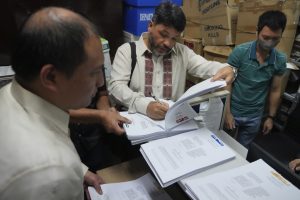Relatives of victims of alleged war crimes committed by Myanmar’s military have filed a criminal complaint in the Philippines, the latest bid to bring the country’s ruling military clique to justice in a foreign court.
In a statement yesterday, the Myanmar Accountability Project (MAP), a London-based advocacy group, said that five victims from Myanmar’s Chin State have filed a criminal complaint with the Department of Justice in Manila. In what the statement described as “an unprecedented move,” they have requested that Filipino prosecutors open a war crimes investigation into ten members of the military’s administration that seized power in February 2021, including Senior Gen. Min Aung Hlaing.
The complaint centers on the mass arson attack on the town of Thantlang in Chin State in northwestern Myanmar in September 2021. During the attack, soldiers destroyed some 2,000 homes destroyed and killed at least 250 people. Around 60,000 civilians were driven toward the nearby border with India. The complaint accuses the military of murdering civilians, mutilating bodies, burning down hundreds of houses, destroying churches, and using aid as a weapon of war.
Among the five complainants is the daughter of a man who was shot and killed by Myanmar soldiers on September 29 along with his friend. “My father and his friend were murdered,” Zing Raltu said through tears during a press conference in Manila yesterday. “We will never get justice through the Burmese courts. We pray that the Philippines will hear our cry for help.”
Another complainant is the uncle of Cung Biak Hum, a Christian pastor who was shot dead by soldiers on September 18, as he was attempting to put out fires started by the army.
As Thantlang native Lian Bawi Thang wrote in these pages yesterday, the town has become a ghost town in the two years since the arson attack, and is the subject of sporadic but fierce fighting between the Myanmar military and the various resistance groups based around the outskirts of the town.
The complaint has been brought under the 2009 International Humanitarian Law Act, which “incorporates into national legislation the international crimes of genocide, crimes against humanity, and war crimes.” The law obligates the Philippines to prosecute these crimes when they are committed elsewhere in the world under the principle of universal jurisdiction.
Gilbert Andres, one of the two Filipino lawyers representing the plaintiffs, said in the MAP statement that the law built “on a long humanitarian legal tradition in the Philippines.” He added, “It doesn’t matter that the crimes were committed by non-Filipinos against non-Filipinos outside Philippine territory.”
Philippine government prosecutors have 90 days to approve or dismiss the complaint.
The Philippine case is just the latest in a string of legal cases that have been initiated in foreign courts, in pursuit of the years-long goal of bringing Myanmar’s generals to justice. Most have employed the principle of “universal jurisdiction,” which Human Rights Watch defines as “the principle that every state has an interest in bringing to justice the perpetrators of particular crimes of international concern, no matter where the crime was committed, and regardless of the nationality of the perpetrators or their victims.”
Cases have been initiated in Turkey, Indonesia, and Germany, focusing on both the military’s ethnic cleansing of the Rohingya communities of Rakhine State in western Myanmar, and atrocities that have been committed since the coup. In November 2021, courts in Argentina agreed to investigate crimes committed by Myanmar’s military against the Rohingya. The actions of Myanmar’s generals also are under investigation by the International Criminal Court and in a genocide case at the International Court of Justice, both in The Hague.
In comments given to The Associated Press, the MAP’s Chris Gunness said that the case was a chance for the Philippines to rehabilitate its image, after the 2016-2022 tenure of President Rodrigo Duterte, who was accused of killing thousands of suspected drug dealers during a bloody “war on drugs.”
“This is an opportunity for the Philippines to show the world a different face,” Gunness told the AP, “a Philippines, which is rooted in the rule of law, in decency, in democracy and in Christian values.”
One of the main challenges of universal jurisdiction cases, assuming that they proceed to the point of a trial, is detaining the accused. were Min Aung Hlaing and his cronies can simply avoid traveling to the Philippines. Even then, it is far from certain that the Philippine government would execute an arrest warrant for a sitting foreign leader, however illegitimate, given the norms of “non-interference” that govern relations between the Association of Southeast Asian Nations (ASEAN) states.
That said, there is greater significance to cases brought in Myanmar’s immediate neighborhood, and any case that makes the lives of the Tatmadaw top brass more difficult is well worth the effort.

































